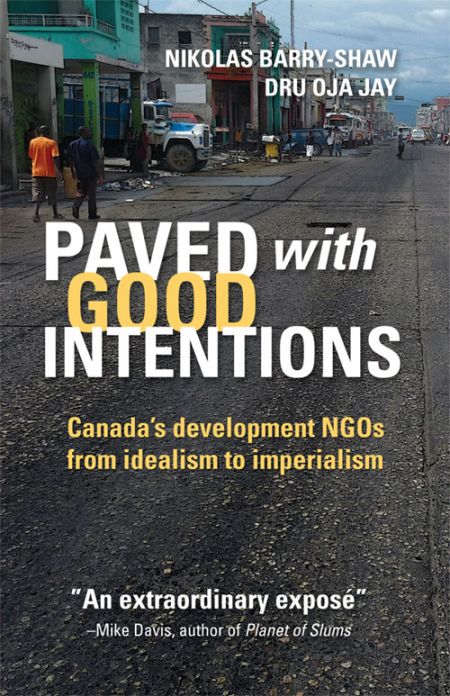"Few institutions epitomize Canada's foundational myth of international benevolence like the non-governmentmental organization (NGO) devoted to development abroad." So opens
Paved with Good Intentions, a book that uncovers the darker side of this country's "development industry."
Dru Oja Jay, co-author of
Paved with Good Intentions, is preparing for a
Nova Scotia book tour. The Halifax Media Co-op interviewed him over email from his home in Montreal to discuss the role development NGOs* play abroad and at home.
*Development NGOs are defined in the book as professionalized non-profit organizations that depend on the Canadian International Development Agency (CIDA) for funding and whose primary aim is to permanently remedy poverty in the Third World.
Why write a book critiquing Canadian development NGOs*?
It's an important question. Years ago, we considered NGOs as a part of the broad progressive sphere. We considered them allies of a sort -- folks we often disagreed with, but who generally had the same values. And opening up divisions among progressives, especially public ones, is a delicate matter. There's a lot of division and recrimination on the left, followed by frustrations at our various failures, followed by more of the same.
What changed our mind is when we realized that there are some good people who work in NGOs, but as organizations that get most of their funding from the government, they're actually unable -- in an official capacity -- to hold an opinion that would lead to any kind of action which undermines the government's policies.
Development NGOs have a tremendously influential role in shaping how people, especially young people, develop their ideas about how to change the world for the better. A lot of staff and a lot of volunteers who are involved in NGOs start to internalize those kinds of limitations. So there's more than just what work they do that's at stake. It's about the expectations and aspirations, which is to say the politics, of each new generation and how they're formed.
You say that NGOs do more harm than good. Could you explain?
Nikolas and I started working on the issues of NGOs because our experience working in solidarity with Haiti. As folks hopefully know, that country's democratically-elected government was overthrown by a coup d'etat that was militarily, diplomatically and financially backed by Canada, as well as France and the USA.
At that point, the unelected coup government was killing thousands of people in what was a vicious campaign of political repression. We went to NGOs for help to campaign against Canada's central role in supporting that brutal regime. What we found was astounding. Not only were NGOs not willing to criticize, they were taking an active role in legitimizing and encouraging the violence.
Alternatives [a Montreal-based NGO], which is by reputation one of the most progressive NGOs, actually wrote articles criticizing occupying military forces for not cracking down hard enough on "criminals." This was at a time when thousands of political activists were being killed, imprisoned or forced into hiding.
How could so many good intentions go so wrong?
The Haiti episode shows how quickly money changes things. At the time, we were shocked that progressive folks who say they're working for democracy and human rights would support a violent coup d'etat against a democratically elected government. It all started to make a little more sense when we found out that about 70 per cent of Alternatives's funding was coming from the Canadian government; a big chunk of that at the time was to work on projects in Haiti.
We're not saying that NGOs act unprincipled all the time. Alternatives, the same folks we criticize, got their funding cut because they took a stand about their activities in Palestine, which the Harper government is obviously unhappy about. Now they don't have those programs anymore. So that's the choice every NGOs faces eventually, be principled and lose your funding, or toe the line and the money might keep flowing.
You say NGOs have become an integral part of the 'development industry.' What do you mean by development industry?
The vast majority of NGOs don't even pretend to be progressive, and a lot of them operate in really regressive ways. We pick on Alternatives not because they're the worst, but because they're a sort of best case scenario with development NGOs.
Most NGOs have long since internalized the idea that you can't criticize the Canadian government and the policies it supports. The trouble is, if you're a development NGO, your goal is to find permanent solutions to poverty. But the policies the Canadian government is pushing, often imposing on countries, actually cause poverty.
If you look at the history, there's a huge increase in the number of NGOs starting around the debt crisis in the late 1970s, and this "NGO boom" continues until the present. If you look at the World Bank and other reports from that period, they're saying structural adjustment programs create a lot of poverty, and NGOs don't actually make anything better, but what they do very well is to remove the dissent. Development NGOs do that by hiring people who might otherwise be fighting against neoliberal policies that make people poor, and getting them to do stuff like build wells and schools.
That's why we call it an industry, because it's a process of manufacturing consent for this system that causes poverty, while doing things that it feels good to do. But you can have dozens of NGOs building schools in a country; it doesn't make up for the fact that Canada and the other rich countries just forced them to cut their education system.
Many people who do development work argue against the charity model by saying "Give a man a fish and you feed him for a day. Teach a man to fish and you feed him for a lifetime." Why does that not go far enough?
I think that it erases the fact that the person who is exhorting you to "teach a man to fish" is often the one who is polluting the river, depleting the fish stocks, and reselling fish at inflated prices on the world market while using their distribution monopoly to extract ever-lower prices from fishers.
You don't fight that by teaching someone to fish, so much as you fight it by taking away the social license of the exploiter. You stop giving them subsidies, you stop putting them into political office, and you stop letting them run the media. And that's what most development NGOs can't do, because they're on the payroll too.
Given your critique of developmental NGO's, what would your advice be to a new idealist graduate of International Development?
Seperate your paid work from your activism. The NGO system preys on the expectation that we can challenge the system and earn a nice middle class salary. There are only a few positions available in organizations that were funded by people and not governments or foundations. The Canadian government gives hundreds of millions of dollars per years to NGOs. There's no way in the mid- or short-term that grassroots groups are going to be able to match that number, so the thing to do is break the relationship of financial dependence that exists.
You say, "Solidarity activism must be unabashedly political … in the sense of fighting for a different social order." What is the alternative to NGO work for people fighting for a more just world for everyone?
There's an amazing amount of activity, but it's not well funded and not well-known. We made a list of grassroots solidarity groups that don't take government money, that we put on our
web site. Because it's a tiny percentage of the population that's involved in grassroots activity, "fighting for a different social order" mostly means trying to get the Canadian government and corporations to stop wrecking peoples' lives and the environment in particular places. A lot of the focus is on creating space for people to be able to make decisions about their own lives without having an economic system imposed on them or having their natural resources stolen. Those are the things that Canada is a major force for in the world right now.
Talking about positive plans, and building a real alternative at the same time as we fight for that space; being better coordinated and building a movement that has more capacity -- I think these are the things that can be worked on.
Dru Oja Jay will be speaking in Halifax on March 21st. For more information, click here.




